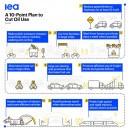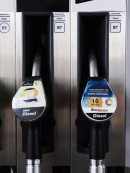The International Energy Agency, or IEA, has announced a 10-point plan to cut oil use. It is just a proposal, but it will affect motorists in many countries if it gets applied by governments across the world. Some ideas are not entirely against cars, but you might not like some of them.
We will start with the one that will lead most headlines, which is a proposal to reduce speed limits on highways by at least 10 kph (6.2 mph). That may not sound like a lot, but it should make drivers travel at lower speeds, which will mean a reduced fuel consumption on the highway.
It is important to note that driving too slow in certain conditions brings an increased fuel consumption, so governments would have to think this through before applying the proposed changes.
The second measure proposed by the organization to cut fuel use is to have people work from home up to three days a week wherever possible. Another measure involves having car-free Sundays in large cities, which may sound like fun until you realize you cannot use your car every Sunday when that happens.
The fourth measure involves making public transport cheaper, as well as offering incentives for cyclists, micromobility solutions, and even walking.
The fifth recommended measure involves alternating private car use in large cities, which would mean that only half of existing private cars would get to be used on that day, and it would depend on the numbers written on a license plate.
The sixth measure suggested is to urge people to start carpooling, as well as share cars, so that fewer cars will be on the road each day. The seventh measure is more interesting, as it involves both logistics, private companies, and more.The proposed measure is to promote the efficient use of freight trucks and goods delivery. We might be going on a limb here, but this is probably being done anyway by companies looking to optimize their operations.
The International Energy Agency has also proposed people choose high-speed and night trains instead of airplanes whenever possible. The ninth proposal is to avoid business travel when alternatives, such as online meetings, exist.
The last of the ten submitted solutions to reduce oil usage is to hasten the adoption of electric vehicles, as well as more efficient vehicles overall.
As you can observe, almost half of these proposals mean changing consumer habits, as well as having people spend more money on travel, commuting, or vehicles. Less than half of the measures proposed involve government action.
Evidently, if you want to spend less money on fuel, our suggestion is to follow these fuel saving tips, as well as try to reduce the distances you drive each week. Buying a more fuel efficient car is a large expense, and will only help you save if you drive a gas guzzler today.
It is important to note that driving too slow in certain conditions brings an increased fuel consumption, so governments would have to think this through before applying the proposed changes.
The second measure proposed by the organization to cut fuel use is to have people work from home up to three days a week wherever possible. Another measure involves having car-free Sundays in large cities, which may sound like fun until you realize you cannot use your car every Sunday when that happens.
The fourth measure involves making public transport cheaper, as well as offering incentives for cyclists, micromobility solutions, and even walking.
The sixth measure suggested is to urge people to start carpooling, as well as share cars, so that fewer cars will be on the road each day. The seventh measure is more interesting, as it involves both logistics, private companies, and more.The proposed measure is to promote the efficient use of freight trucks and goods delivery. We might be going on a limb here, but this is probably being done anyway by companies looking to optimize their operations.
The International Energy Agency has also proposed people choose high-speed and night trains instead of airplanes whenever possible. The ninth proposal is to avoid business travel when alternatives, such as online meetings, exist.
The last of the ten submitted solutions to reduce oil usage is to hasten the adoption of electric vehicles, as well as more efficient vehicles overall.
As you can observe, almost half of these proposals mean changing consumer habits, as well as having people spend more money on travel, commuting, or vehicles. Less than half of the measures proposed involve government action.
Evidently, if you want to spend less money on fuel, our suggestion is to follow these fuel saving tips, as well as try to reduce the distances you drive each week. Buying a more fuel efficient car is a large expense, and will only help you save if you drive a gas guzzler today.















